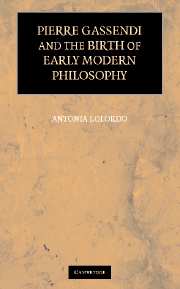Book contents
- Frontmatter
- Contents
- Preface
- References to Gassendi's Works
- Introduction
- 1 Gassendi's Life and Times
- 2 Gassendi's Philosophical Opponents
- 3 Skepticism, Perception, and the Truth of the Appearances
- 4 Cognition, Knowledge, and the Theory of Signs
- 5 Space and Time
- 6 Atoms and Causes
- 7 Bodies and Motion
- 8 Generation, Life, and the Corporeal Soul
- 9 The Metaphysics of Body
- 10 Faith, Reason, and the Immaterial Soul
- Bibliography
- Index
8 - Generation, Life, and the Corporeal Soul
Published online by Cambridge University Press: 24 July 2009
- Frontmatter
- Contents
- Preface
- References to Gassendi's Works
- Introduction
- 1 Gassendi's Life and Times
- 2 Gassendi's Philosophical Opponents
- 3 Skepticism, Perception, and the Truth of the Appearances
- 4 Cognition, Knowledge, and the Theory of Signs
- 5 Space and Time
- 6 Atoms and Causes
- 7 Bodies and Motion
- 8 Generation, Life, and the Corporeal Soul
- 9 The Metaphysics of Body
- 10 Faith, Reason, and the Immaterial Soul
- Bibliography
- Index
Summary
Along with the vast majority of his philosophical tradition, and in contrast with Descartes, Gassendi distinguishes between inanimate bodies on the one hand and plants, animals, and human beings on the other. The process of generation crucially requires powers that cannot be reduced to the powers of atoms taken singly or woven together into concretions. These powers are either emergent or divinely super-added to certain systems of matter; Gassendi, as we shall see, offers two alternate cosmologies grounding each of the two possibilities. Thus, the programmatic atomist claims that Gassendi advances at the beginning of the Syntagma are implicitly restricted to the nonliving. He does indeed hold that there are no forms or qualities beyond ways of describing complex local motions. But he does not think of generation as a matter of qualitative change any more than Aristotle did, and hence generation is not intended to fall under the scope of claims about the reduction of qualities to local motion.
Similarly, the sentient powers of animals are either emergent or superadded. Indeed, they derive from the same seeds that are crucial for generation, seeds endowed with a sensory capacity and a vis seminalis. Animal souls have powers beyond sensation and generation, of course: In addition to providing the power of locomotion, they contribute powers shared by plants and animals such as growth. However, I limit my discussion to two powers, generation and sensation.
- Type
- Chapter
- Information
- Pierre Gassendi and the Birth of Early Modern Philosophy , pp. 183 - 207Publisher: Cambridge University PressPrint publication year: 2006



